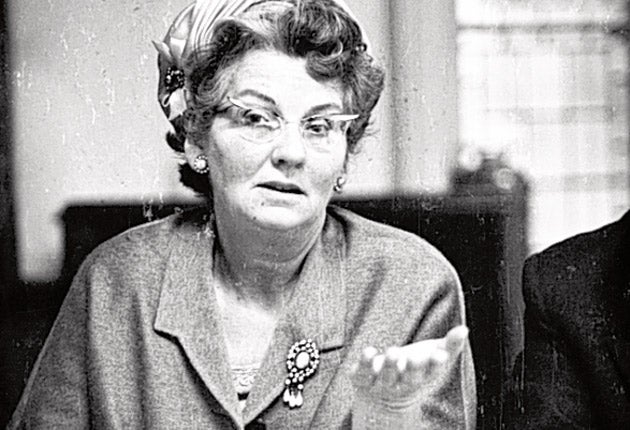The Week In Radio: Yes, there's something about Mary Whitehouse

I rather liked Mary Whitehouse. She would often ring me up in a previous journalistic incarnation to "draw my attention" to upcoming outrages. And when she did she was always polite, intelligent and firm, like the girls' school teacher she once was. If the tide of filth had already been broadcast, she would read out the profanities, "eight bloodys, two buggers and a Christ", in her special, taking-the-register monotone, which always enlivened a dull day. And while her repressive views on homosexuality and pre-marital sex were deeply unappealing, her biggest impact on broadcasting was not about sex at all. It was establishing the idea that listeners and viewers should have a say in what broadcasters provide.
Whether she would have liked her 100th birthday marked by one of her bugbears, Joan Bakewell, is debatable. But in the latest of an excellent run of Archive on 4, The Mary Whitehouse Effect, Bakewell took a measured look at her impact and managed to separate the prejudice from the principle. One of those who emerged least well was Hugh Carleton Greene, the director general, who would say, "Just had another 2,000 complaints and a letter from Mary Whitehouse. Well done, everybody!" He wanted her banned from the airwaves and considered her "persona non existent" – a cavalier attitude that no director general would get away with today. And while Mary's Clean Up TV campaign was undoubtedly fuelled by blinkered religious fundamentalism, at a distance other aspects, like her objections to the coarsening of society and her campaigning abilities, seem admirable. Geoffrey Robertson said he once told her of a gap in legal protection for 14-year-old girls, "and within three months she had achieved an amendment in the law."
It was her train-spotting approach to obscenity that made her a figure of fun. "Mr Hendrix made a number of obscene gestures with his tongue, slid his hands up and down the long neck of the instrument for no apparent reason, and made accelerating rhythmic actions as though simulating the sexual act". But the Whitehouse obscenity audit has lived on to bedevil BBC producers who now have to produce a five-page compliance form for every programme, listing every offensive word. Bakewell said: "Perhaps there is a BBC heaven where Mrs Whitehouse's ghost hovers over this mountain of compliance forms and feels satisfied that she was right."
It's obviously Mary week, because the most famous Mary of all was subject to scrutiny by Rosie Goldsmith, exploring how the Virgin became "the most important woman in the world". Thoroughly Modern Mary was an interesting trot through all facets of the Marian cult, and why it seems to be gaining popularity – in part due to the fervour of the last Pope. Marina Warner, who once predicted feminism would cause Mary to fall out of favour, admitted, "I was wrong", and as usual Richard Dawkins performed the role of Bad Fairy, dismissing the immaculate conception as "a disgusting theological idea" and Mary herself as "a submissive, cosmic doormat".
What Mary (W not V) would have made of "Leaving Normal", the Woman's Hour comedy about gay couple Sammi and Luke, God alone knows. It opened to the sounds of lively sex between Sammi and a stranger, to the dismay of Luke. "You think on our anniversary you could maybe not have sex with another man?" Sammi's plans to attend "underwear night" at Horsemeat are disrupted when two orphaned children come to stay. Clive Brill's production has a witty script "We have a sling in the cellar! There's no way we're traditional parents", and a fine performance from Imelda Staunton as Luke's interfering mum, but I think it's fair to say had Mary been around, she would have been on the phone roughly 30 seconds in.
Join our commenting forum
Join thought-provoking conversations, follow other Independent readers and see their replies
Comments
Bookmark popover
Removed from bookmarks